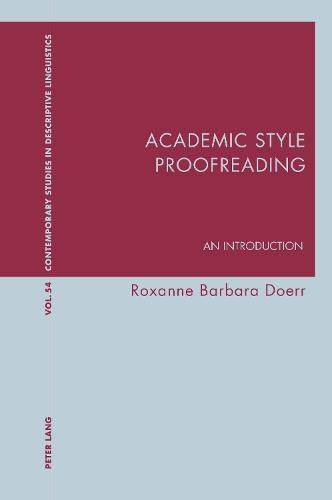Readings Newsletter
Become a Readings Member to make your shopping experience even easier.
Sign in or sign up for free!
You’re not far away from qualifying for FREE standard shipping within Australia
You’ve qualified for FREE standard shipping within Australia
The cart is loading…






This title is printed to order. This book may have been self-published. If so, we cannot guarantee the quality of the content. In the main most books will have gone through the editing process however some may not. We therefore suggest that you be aware of this before ordering this book. If in doubt check either the author or publisher’s details as we are unable to accept any returns unless they are faulty. Please contact us if you have any questions.
<>
(John Casey Gooch, Associate Professor of Rhetoric and Literature, University of Texas at Dallas, USA)
<>
(Karen Dwyer, PhD, Lecturer (Teaching) in Modern English Grammar and Research Methodology, University College London)
In the current international context, it is increasingly required to write not only <> but also in accordance with the stylistic expectations of the academic community. However, because academic style and its standards are only mentioned - if not glossed over - in textbooks and journal guidelines, many non-native students and scholars receive their linguistically correct papers with recommendations to <> but are unable to comprehend where the problem lies or how to address it. Moreover, change in and confusion among the language professionals who are in a position to assist these scholars - that is, revisors, copyeditors and proofreaders - impedes any clarity in terms of who should rework academic style before submission and publication.
This volume seeks to unpack the concept of <> and its components through a multifaceted analysis including methodologies such as terminology, corpus stylistics and error analysis. This is intended to define the purpose and intricacies of this new aspect of academic writing and present common errors in academic style, as well as possible proofreading solutions, in economics and the humanities. In doing so, the book presents an assessment of the issues, methods and implications of academic style proofreading for research, professional and educational purposes.
$9.00 standard shipping within Australia
FREE standard shipping within Australia for orders over $100.00
Express & International shipping calculated at checkout
This title is printed to order. This book may have been self-published. If so, we cannot guarantee the quality of the content. In the main most books will have gone through the editing process however some may not. We therefore suggest that you be aware of this before ordering this book. If in doubt check either the author or publisher’s details as we are unable to accept any returns unless they are faulty. Please contact us if you have any questions.
<>
(John Casey Gooch, Associate Professor of Rhetoric and Literature, University of Texas at Dallas, USA)
<>
(Karen Dwyer, PhD, Lecturer (Teaching) in Modern English Grammar and Research Methodology, University College London)
In the current international context, it is increasingly required to write not only <> but also in accordance with the stylistic expectations of the academic community. However, because academic style and its standards are only mentioned - if not glossed over - in textbooks and journal guidelines, many non-native students and scholars receive their linguistically correct papers with recommendations to <> but are unable to comprehend where the problem lies or how to address it. Moreover, change in and confusion among the language professionals who are in a position to assist these scholars - that is, revisors, copyeditors and proofreaders - impedes any clarity in terms of who should rework academic style before submission and publication.
This volume seeks to unpack the concept of <> and its components through a multifaceted analysis including methodologies such as terminology, corpus stylistics and error analysis. This is intended to define the purpose and intricacies of this new aspect of academic writing and present common errors in academic style, as well as possible proofreading solutions, in economics and the humanities. In doing so, the book presents an assessment of the issues, methods and implications of academic style proofreading for research, professional and educational purposes.